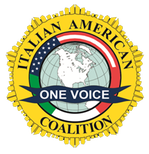|
Years ago while anchoring a very popular TV morning show I was approached by another anchor at the station. He was an older African American man who admired my outfit. What he said next I’ll never forget. “You look terrific in that suit and tie. Just like a made man.” A ‘made’ man as in a Mafia soldier. I found it odd and told him as much. I said, as sternly as I could, ‘That is not only not funny, but no longer acceptable,’ and walked away. To his credit he found me about 20-minutes later and in private apologized for what he had said. Till this day I am amazed by the comment. Here was a prominent African American man, a friend and someone who should have known better, who didn’t think twice about connecting me in some way, shape or form to the very worst element of Italian American society, a disgusting subculture that continues to fascinate people. It’s something I’m am certain he never would have done with someone of any other nationality. I tell this story for two reasons. First, the incident reinforced in me that even though Italian Americans involved in organized crime represent a tiny sliver of the 20-million hard working Italian Americans – we continue to be, without hesitation by some, associated with this sickening element of our people. We, like so many other nationalities, have worked hard to achieve greatness. Two of the nine U.S. Supreme Court Justices are Italian Americans. The former Speaker of the House of Representatives, Nancy Pelosi is an Italian American. The governors of New York and New Jersey are Italian Americans. As are captains of business like Paul Otellini, the CEO of the tech firm Intel, Sam Palmisano, Chairman and CEO of IBM, and probably the most famous, former Chrysler head Lee Iacocca. Not to mention the countless educators, physicians, writers, chefs, TV and movie stars and reporters. So why does this continue? I agree with others that it is because we continue to be seen in the media as mobsters. I also believe in many cases we are our own worst enemy. Where are the stories about great Italian Americans? And why aren’t actors, directors and TV show producers, who long ago made their money, devoting some of their blessings to telling the story of those of us not involved in organized crime? Worse yet, we continue to see famous Italian American actors taking the path of least resistance. Taking that job portraying a mobster without telling the director or producer, ‘haven’t we done enough of this’? There is however reason for hope. I was speaking with a high school friend of mine who went on to Hollywood greatness starring in many popular TV shows dating back to the 1970s. He told me a while back that he won a part as a judge on a legal drama to be aired on one of the major networks. He had enough clout to make an important demand before agreeing to accept the part. He insisted that the judge be given an Italian American name. The producers acquiesced. For him it was a small victory in his fight to turn the tide. It was important to him that after years of playing mobsters to feed his family he now had the clout to call the shots. He wanted to depict a judge for all to see who was an Italian American. You may think that educated Americans know better; that they know the mob is a subculture and does not in any way represent all of us – but you’d be wrong. In many parts of the country what millions of people see in the media is that EVERY Italian American is a mobster, a buffoon or bimbo. I’ve experienced this first hand in covering stories. I’ve frequently been asked on stories in far flung places whether I am ‘connected.’ So what’s the average Italian American to do? I would suggest you do what I did. Change the minds of those who don’t know – one at a time. Practice one line or two that conveys to those who insult you by lumping us in with mobsters and be ready to use it. Practice it. Practice it again. Have it ready. And when the time comes, deliver as firmly and as politely as you can. Just like I did. Don’t meekly chuckle when someone insults your heritage. Don’t nod. Seize that teachable moment to teach. We may not be able to turn the tide all at once – but if we have to, we will do it one person at a time. At that TV station all those years ago I seized the moment to teach someone that what he said was no longer right. I suspect he never made a comment like that again. Frank Cipolla is a radio and TV news anchor and reporter who has been seen and heard in and around New York City and nationally for more than 30-years. Caption Frank Cipolla
0 Comments
Leave a Reply. |
Archives
January 2015
Categories |
The Italian American ONE VOICE Coalition, Inc. is an IRS registered 501(c)3 non-profit corporation - EIN 22-3361110.
© Italian American ONE VOICE Coalition. All rights reserved.

 RSS Feed
RSS Feed